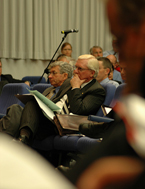Just over 150 years ago, Sydney Anglicans received their first evangelical Bishop.
After being consecrated at Lambeth earlier, Frederick Barker arrived 25th May 1855, and immediately began to consolidate the work of the gospel for the sake of Australia's future. But, behind him, there is an even more important story to be told.

The history of the laity in the Anglican Church of Australia is yet to be written. When this task is done, tremendous high points will be revealed as well as tragic low points.
The early colonial period must be one of the high points. Under the care of evangelical chaplains earliest NSW was also studded with prominent free settlers who were of the same mind and put time, money and energy into the cause of the gospel in this vast new colony.
As Moore College celebrates its sesquicentenary this year, it is worth putting on record once again, that Thomas Moore, benefactor of the college,was one such Anglican layman.
Although their story has been almost entirely neglected by historians, the influence of the Christian laity of the early colony should not be underestimated.
The arrival of the Tractarian bishops and clergy in Australia must be one of the low points for Australian laity. The lectures and addresses given to celebrate the sesquicentenary of the Oxford Movement (published in Brian Porter, Colonial Tractarians 1989) demonstrated that it was gospel-minded laity who were the casualties in Adelaide, Victoria, and Tasmania, as they battled with Tractarian bishops and clergy.
In Sydney at the same period, William Macquarie Cowper reported that "a wave of what was then known as Tractarianism [" ] had found its way to these shores' introducing practices and doctrines which "were strange and distasteful to the congregations which they were sent to minister, and much unhappy feeling was engendered'.
In Sydney, it was the strong evangelical laity who resisted changes in this direction, and, when Bishop Broughton died, the evangelical Bishop Barker was appointed, largely because of their strong presence.
Sydney's laity have continued to stand up for biblical truth.
The laity's strong resistance to the ordination of women to the priesthood when it was under intense debate bears testimony to this fact.
Their resistance to this particular pressure also spoke loudly of the importance of the laity: a person doesn't have to be ordained to exercise ministry. The very presence of Sydney's many lay assistants, both male and female, eloquently proclaims the same message.
Ordination is not necessary for ministry"” not even to the diaconate! The more than thirty year drive towards the removal of barriers to suitable lay people presiding at the Lord's Supper shows that our laity still have a voice that wants to be heard and, God willing, will be heard.
The long tradition of lay involvement both in ministry and in diocesan decision making is something to thank God for. Lay people with a gospel heart read their Bible and often read the plain message, without the "juggling tricks' of the scholars! Lay people with a gospel heart can often sense when something doesn't sound like it breathes the same air as their New Testament. Lay people certainly feel the pull of the world"”they are very much in it"”but this trains their spiritual muscles, for they must learn to stand up for God's Word in a whole range of ways, almost on a daily basis. They don't want to spend all that time holding the line, and then to see their own denomination throw away biblical truth under the same worldly pressure.
The lay people of Sydney once saved Sydney for the gospel, insisting that their bishop should be a Bible believer, preacher, and teacher. As a result, Barker came and the gospel work was consolidated.
As Sydney Synod continues to hold the biblical line when so much of Australia and the rest of the Communion
is capitulating, let's hope that the future headlines can proclaim the same message:
The laity saved Sydney from decline. Þ
























